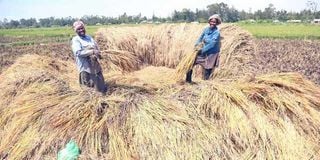Spare a thought for rural woman burdened by unpaid care, chores

Women work in a rice paddy in West Kano irrigation scheme, Ahero, Kisumu County on October 14, 2020.
What you need to know:
- This category of women, who are 60 and above, comprise a huge number of victims of sexual and gender-based violence (SGBV).
- These women will mostly suffer in silence, including at the hands of close family members such as irresponsible sons, grandsons and even daughters.
When Covid-19 struck, the government moved fast to impose containment measures, including movement restrictions. Those hit the hardest, especially by the partial lockdown, were obviously residents of cities, particularly Nairobi.
It was not surprising, then, that when the restrictions on movement were relaxed, “Nairobi people” quickly streamed to their respective rural homes — many with their children and other dependents, including relatives and house-helps, in tow — to seek refuge there.
There still are those who chose to return to the towns and cities shortly afterwards, leaving behind their children to be cared for, albeit temporarily, by their parents, with the argument that home was “safer”, given the gravity and uncertainty of the unprecedented global pandemic.
As usual, the ever-so-loyal mainly older women took up the added responsibility of caring for their grandchildren and great-grandchildren without complaining. Some were left without a coin to feed the additional mouths, the culprits holding the misguided perception that there is ample food in the rural areas and one does not need to spend much on feeding a family there.
With such discernment, the mother, grandmother and great-grandmother in the rural areas finds herself with a further burden — unpaid care and domestic work in times of a pandemic that drains their little savings.
In addition, this category of women, who are 60 and above, comprise a huge number of victims of sexual and gender-based violence (SGBV), which is habitually unheeded, disregarded and even ignored.
Sadly, these women, already enduring isolation even as they put on a brave face, especially during the coronavirus pandemic, will mostly suffer in silence, including at the hands of close family members such as irresponsible sons, grandsons and even daughters.
Putting up with violence
Growing up in the village, and having witnessed much domestic violence, there was a common peculiarity among our mothers, who were victims of the cruelty of physical and emotional violation: However vicious, they endured it.
In such a setting that stifled their rights, most of them were oriented towards submission to violence and abuse.
In explaining away their putting up with the violence — since they clearly lacked a social support system — the vulnerable women would preach to their daughters, other girls and relatives the “merits” of “perseverance” for the sake of the children and the good of the family.
This was, and is, the lack of access and control over resources, including ownership of land (never mind that they do most of the work on it and produce the food) and economic suppression, without which they could choose a more independent life free of violence, abuse and exploitation.
Shrinking land acreage for most families due to the increasing population every so often means, to women living in rural areas, years of bad blood from relatives, at times their own children, fighting for control of the resource, the miniature size notwithstanding.
And the elderly women become more vulnerable to violence and other violations, now more pronounced during Covid-19.
So, as they went on with their daily chores at home, hardly any of these women were aware that last Thursday was a special day set aside by the UN to celebrate and recognise them. Since 2008, October 15 has been observed as the International Day of Rural Women, to recognise their critical role and contribution, particularly in improving food security and fighting poverty.
And this year’s theme, “Building rural women’s resilience in the wake of Covid-19”, is apt, as the UN says, “to create awareness of these women’s struggles, their needs, and their critical and key role in our society”.
Let’s recognise and appreciate the instrumental contribution to national development by women in the rural areas and their role in ensuring the family’s sustainability.





